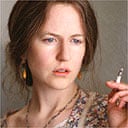One of the merits of Stephen Daldry's The Hours is the way in which the movie shows Virginia Woolf as an author. It is not so much in the scenes of actress Nicole Kidman surrounded by pen, ink and paper, but in the way her work - particularly Mrs Dalloway, the novel Woolf is writing in the 1923 part of the movie - exerts its influence over the stories set in 1951 and 2001. Yet the script's literary content is balanced by the everyday: the small acts of kindness, the random mood-changing events of normal existence: what Woolf called "the question of things happening, normally, all the time".
I know she wrote these words, not because I've studied her life or work, but because they're the first thing I read, in a catalogue, when I wander into a local exhibition of prints by Anita Klein. My personal stereo is playing Philip Glass's soundtrack to The Hours (Nonesuch). Quotidian coincidence. And now I'm sitting in a cafe, writing, listening to Julia Wolfe's The String Quartets (Cantaloupe) when suddenly everybody cranes towards the plate glass. A bright red ambulance helicopter is hovering noisily overhead, a bit of unexplained drama to punctuate the bright afternoon, with Wolfe's frenetic late modernism as my personal movie score.
If this were a movie soundtrack, the abrasive harmonies would signify fear and loathing; the fast, sawing ostinatos would mean pursuit; and the high, sustained violins would herald some prosthetic horror. Wolfe's piece Early Last Summer contains all these sounds, but it is hardly movie music. Like the other two quartets on this album, it demands your undistracted attention. Though Wolfe is perhaps the most interesting of the Bang On a Can composers, she seems here to be hankering for an uncomplicated modernist past, where only the most strenuously "difficult" stuff achieves nirvana. All the same, the pieces are painstakingly produced by Michael Riesman and superbly performed by three different quartets.
My biographical dictionary describes Virginia Woolf as "the archetypal modernist". While Woolf was writing Mrs Dalloway, James Joyce was beginning Finnegans Wake, and Ludwig Mies van der Rohe was drawing visionary plans for steel and glass cities in the air. Mies first realised his ideas in private houses such as the Villa Tugendhat in Brno, minimalist constructions fashioned from expensive materials. In Robert Hughes's TV film about Mies last week, you could see a parallel with Glass. At its best, his music provides a creative setting: for novelists (like Michael Cunningham, author of the novel The Hours) to write; for opera producers to realise their visions. "Without the house," says Robert Hughes of Farnsworth House, "it's just trees." The house makes it a landscape.
And so Glass's score for The Hours, performed on the CD by Michael Riesman with the Lyric Quartet, provides a grid - simple and complex by turn - that helps a sequence of faces and fragmented stories become a rich and satisfying movie. Like Glass's music itself, the film is threaded with repeated, rhyming gestures: a kiss on the lips; an unexpectedly early arrival; and flowers - bouquets and bunches and vases of blossoms multiply like bowed arpeggios.
Yet despite the unmistakable signature, the music does not become a dominant character, as it does in the movies of the Coen brothers, or of Kieslowski; nor does it force emotions upon the actors or viewers. The long "Morning Passages" section feels like a piano concerto from an alternative 12th century, to which the director has found matching images. In some respects it works as fake classical music in the way that Elmer Bernstein's superb score for The Sweet Smell of Success used fake jazz to skewer its hollow main characters. By contrast Glass's score for The Hours adds dignity and depth to the people and things in the movie, and to the tragedies and triumphs, big or small, of ordinary life.
